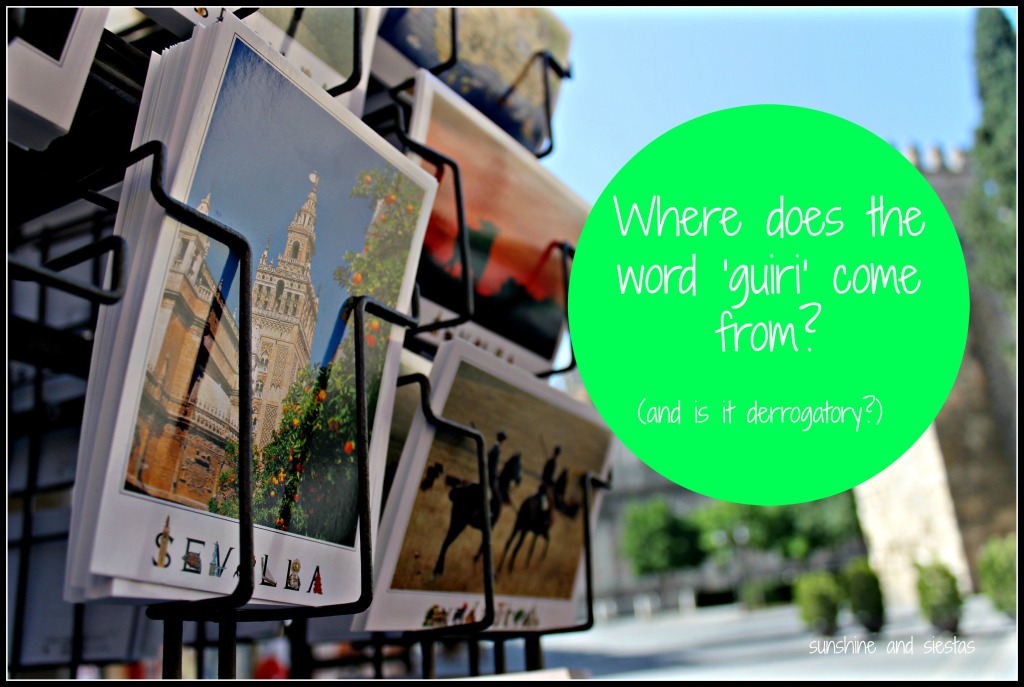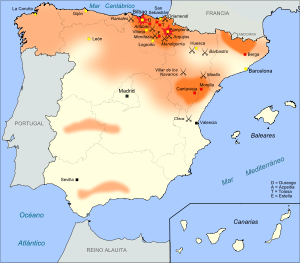Hay alguién aquí de fuera? called the drag queen from the stage. A hoarse shout came from right behind me: “Mi guiri, mi guiri!”
My friend S had sold me out to a total stranger and a bar full of side-eyeing pijas, and she’d done so be calling me a guiri. This was before any of us turned 30 but after an entire afternoon of beers, so I skipped to the stage and joined the drag queen, dancing all of my shame out. She later apologized for screaming HERE’S A FOREIGNER a few days later, though I’d already consented to another drink after my show as a way to shrug it off.
Guiri is a catch-all phrase for both foreign tourists and Northern Europeans, used more often than not in a joking, affable way. I’d never really taken any interest in knowing where the word come from until an early morning wake up call on a Sunday morning had me watching Canal Sur’s program about the origins of common practices and traditions in Andalucía. If you are into etymology like me, your ears would have perked up when you heard “Where does the word guiri come from?’ I nearly spilled my coffee on our new coach.
The most common explanation is literally a page out of a Spanish history book: The word guiri has existed for some 130 years since the time of the Guerras Carlistas during the first half of the 19th Century, a series of skirmishes that followed the death of King Fernando and that pitted the royal’s only a heir, Isabel, against his brother, Carlos María Isidoro de Borbón (it is, therefore, not a phrase derived from a way to call out the socks with sandals thing).
According to the Royal Decree of 1713, all ascendents to the throne were required to be male, so Carlos V made a play for Isabel’s blue-blood given right. This sparked the first of the Carlist Wars, with Isabel’s mother, María Cristina de Borbón Dos-Sicilias fighting for her daughter.
Those who supported Isabel and her mother became known as cristinos, and fighting was especially fierce in the northern regions of Navarra and País Vasco. Cristinos from this region saw their leader as radical liberals who hoped to make sweeping reforms in the whole country, beginning with the right to the throne. What’s more, the this band received support from other countries like France and Great Britain, causing alarm with the northerns who were, characteristically, more traditional and supporters of Carlos V.
The name for the northern became known as guiristinos to the carlistas, an ambiguation of cristinos in the Basque language. Because the majority of María Cristina’s supporters were Basque and Navarrese, the name stuck and was even used as a way to call Guardia Civil officers during Franco’s regime. At its most basic, it also served as a moniker for outsiders and people with radical new ideas, shortened to simply guiri.

However, the word guiri didn’t become popular in Spain until the 1960s when tourism began to bring thousands of travelers – namely the British and the Dutch – to coastal resorts. Post-war Spain and Francoist mentality were not ready for the influx of foreigners in the wake of two decades of self-sustainability, so guiri became the popular way to call light-skinned tourists, usually from Northern Europe, the US and Canada. (Another beloved Spanish tradition to surge during this decade? The menú del día. Bendito manjar, clearly).
Some decry the word as a direct attack on those who fall into the category, but most Spaniards will insist that it’s a term of endearment. As most groups of friends have the token ‘El Cabesa’ and ‘El Tonto,’ being ‘La Guiri’ is kind of like my calling card, a simple way to distinguish myself and make me feel like I’ve squeezed my way into tight sevillano social circles.
Have you ever been called a guiri? How do you feel about it?






I’ve not heard the term, but maybe it’s because I wasn’t aware. I’m curious if I’ll pick it up next time I’m in Spain. I love this type of thing.
It’s a term I only ever hear (about) on the SoMe – after eight years here, I’ve not heard it once on the street/in bars/anywhere in Extremadura
Sue Sharpe (@suesharpe1) recently posted..Bursting Bubbles
You must really be a local, then! Or maybe it’s a pueblo versus city thing?
I’ve been in Extremadura for about 8 years too, and I hear it almost everywhere I go!
I’m from Extremadura and I can assure you we use it all the time, just like in Andalusia. It’s used all over Spain.
Fair enough, Blanca – But that still doesn’t change the fact that I’ve never heard it! Maybe I just don’t look like one

Sue Sharpe (@suesharpe1) recently posted..Bursting Bubbles
Such a fascinating word history! María Cristina >> cristinos >> guiristino >> guiri. I had no idea!
The Carlist Wars are a time period of Spanish history I’m still really confused about…have to go look into them more closely now!
I need your Spanish history book recs! Time to stop reading Camino memoirs (especially crappy ones) and read something with more substance!
I recommend The Story of Spain by Mark Williams http://www.amazon.com/Story-Spain-Dramatic-History-Fascinating/dp/0970696930/
Trevor Huxham recently posted..Hiking in Spain’s Picos de Europa National Park
Yaay queuing it up, thanks!
Hey Cat!
How strange that I recently wrote about this too, though not in as much detail admittedly. It was more a ‘how not to be so guiri’ kind of a post, which is yet to be published.
I think it’s incredible that the word was coined all those years ago and has survived until now, particularly as it wasn’t really used for so long!
I actually call myself ‘guiri’ a lot. I don’t mind it at all, but it obviously depends on context!
Josh recently posted..Your Chance to Win TWO Spanish Courses!
I call myself a guiri all the time, too! Can’t change the fact that I’m light-skinned and clearly not Spanish, though I love confusing people with my accent! Looking forward to reading your article!
I think it depends on the context. I don’t mind if my boyfriend calls my friends and me guiris, but other people can be rude about it. I guess I should just learn to relax because no one ever pins me for being Spanish!
Paige recently posted..Welcome to The Town Mouse!
I’ve only had one or two rude comments, but people usually shut their mouths when I open mine and say something back in Spanish! You and I have all of the markings of being a guiri, so I just own it!
Ohhh this is so interesting! I had no idea. Thanks for sharing – I too love etymology!
Kirstie recently posted..Captivated by Capri
hi Cat, while it is true as you say that guiri is used to describe Northern Europeans mainly since the 1960’s when Spain opened the doors and floods of tourists mainly from Sweden began to come to the Mediterranean coastline, hence the famous and very well known saying “que vienen las Suecas” (the Swedish girls are coming)…i would like to point out that it is not used to describe all foreign tourists in the sense of any tourist who is not a Spaniard or not from Spain.
people from, say, Mexico, Nigeria, Colombia or Morocco are not guiris at all…such a thing has not to do with racism, it has to do with the Northern European stereotype of a guiri that us Spaniards have in our heads stuck, a stereotype that has made us think that they’ve got blonde hair and blue eyes, or at least that they do not look like an immigrant from Latin America or Africa.
for example if i see a German girl on the beach or taking pictures in a cathedral my brain sees her automatically and instantly as guiri….if i see an Ecuadorian, Colombian, Mexican, Romanian or Moroccan my brain then sees them as immigrants whether they are working in Spain or taking pictures in a cathedral as tourist….believe me that none Spaniard would ever consider them to be guiris, above all along the coastline.
of course a person, say, a British girl with dark hair and dark eyes can be seen as a guiri, for even such a girl looks differently from a Latin American girl for example…i know that what i say may look unfair and ugly, but believe me that it has not to do with racism and things like that.
a dictionary does not usually include senses, so it translates guiri vaguely as a holiday maker and as a foreigner, but believe me that not all foreigners and not all holiday makers are guiris
Hi Pedro, the answer is in the article under the photo of us guiris dressed in trajes de gitanas – guiri refers to light-skinned people from Northern Europe, the US and Canada. I am dark-haired but light-skinned, and I am referred to as a guiri despite not being blonde.
exactly Cat, i just wanted to point out that guiri does not translate as any foreigner as other bloggers tend to do mistakenly….by the way people from Australia or New Zealand can be guiris as well…..let them be part of the world, jaja
i really like that you have brought up this issue!
Cool, I’m glad I finally know where this term comes from!
I’ve been called a guiri just once, by a 13-year-old in a class. But he told me not to worry thought, because he didn’t consider me a “bad guiri” like the ones who “drink and make dirty the streets” (I guess he meant the tourists who come in summer), but a “good guiri” who works. I thought I’d feel insulted the first time some one called me that, but I found it flattering.
Ashley recently posted..El Bosque Pintado
Im from Sevilla and i totally agree with Pedro! Not all the foreigners are guiris. Its cool to find out where this word comes from, i’ve used it many times and i had no idea, thanks for sharing!
Haha…so great! Love the photo of you and the guiri friends. I haven’t been outwardly called it lately. I think I’m more of a target when I’m out with guiri friends drinking or something. Means I need a night out! Thanks for sharing!
Justine recently posted..Park Guell, Spain’s Most Colorful Park
I’d always been told that guiri came from the word ‘guirigay’ meaning dificult to understand or gibberish
http://buscon.rae.es/drae/srv/search?val=guirigay
though the etymology may be the same as guiristino.
And therefore was principally used with Northern European/North Americans who couldn’t speak Spanish.
Some more discussion about it here
http://hispanismo.org/senorios-vascongados/10243-etimologia-de-guiri.html
Hi Paul – it’s all fascinating, isn’t it? I’ve heard the guirigay story, as well.
I’ve been called a guiri occasionally here in the pueblo where I’ve lived for a little over 20 years, just outside of Seville, but only by friends and family, never as an intended insult. I usually just smile and take it good naturedly, as it’s intended. Sometimes if we’re clowning around I might make a funny comment back, such as “I might be a guiri, but I’m not a gilipolla like some non-guiris.” You can slur the two words to make them sound similar. And of course “gilipolla” is a crude word meaning a jerk, so I say that only when the circumstances are right.
Eso es!
I’m form Spain and I had always heard that the word “guiri” comes from “guirigay” (gibberish), referring to someone who speaks a languaje you don’t understand.
I’m quite surprised to discover that the ethimology of the word is so complex.
So proud to be guiris we even have our own facebook page We are a a group of football fans of a Spanish team
https://www.facebook.com/GuirisdelaBalona
So fun! I don’t mind the guiri thing (at all), as I’ve almost never heard it used in a really negative way.
It’s definitely not as despective as others I’ve heard!
Ha! Excellent! I’d never wondered about the etymology of the word “guiri” before. Interestingly, now I come to think about it, I remember hearing the word a lot when I lived in Murcia but I just don’t hear it in Madrid at all – probably because Madrid is such a melting pot and people are more used to people from elsewhere. Like Nilo, in the above comment, I thought the word might have come from “guirigay”.
Louisa recently posted..vísteme despacio…
Guess it’s a bit like “gringo” in Latin America. .depending on context and voice tone, can be neutral or a bit insulting .
Of course, some in USA would claim they “don’t mean anything bad” by saying beaner, or wetback.
Depends on the person, no-one else can really know what’s in another’s heart.
The stereotype of guiri in my experience is of someone kind of rude and crude, loudly shouting in a language other than Spanish. .most often English or German, wearing terrible style of clothes, sandals with white socks, and heavily sunburned. .